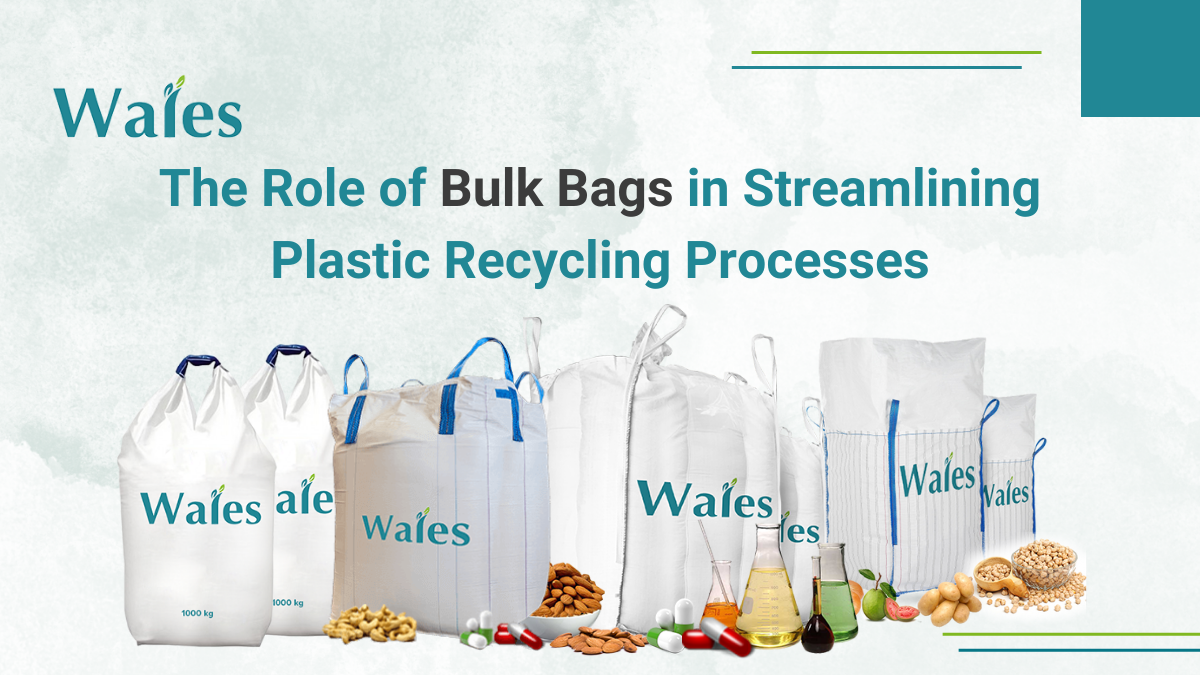The Role of Bulk Bags in Streamlining Plastic Recycling Processes

Plastic recycling is a critical component of global sustainability efforts, and the efficient handling of plastic materials is essential to its success. One of the most innovative solutions in this domain is the use of bulk bags, also known as Flexible Intermediate Bulk Containers (FIBCs) or ton bag. These versatile containers have revolutionized the way plastic materials are stored, transported, and processed in recycling facilities. In this blog, we’ll explore how bulk bags are transforming the plastic recycling industry, their benefits, and the technologies that make them indispensable.
What Are Bulk Bags?
Bulk bags are large, durable containers designed to store and transport bulk materials, including plastic pellets, flakes, and other recyclable plastics. They are typically made from woven polypropylene, which is both lightweight and strong, making them ideal for handling heavy loads. Bulk bags come in various shapes and sizes, including square and round types, and can be customized with features like top, side, or bottom discharge options to suit specific recycling needs.
These bags are widely used in industries such as food, chemicals, agriculture, and construction, but their role in plastic recycling is particularly noteworthy. They offer a cost-effective and efficient way to manage large volumes of plastic waste, ensuring that materials are handled safely and sustainably.
The Importance of Bulk Bags in Plastic Recycling
1. Efficient Material Handling
Recycling facilities deal with massive quantities of plastic waste, and manual handling can be time-consuming, labor-intensive, and prone to errors. Bulk bags simplify this process by allowing recyclable plastics to be stored and transported in large, manageable units. Automated bulk bag unloading systems further enhance efficiency by eliminating the need for manual lifting, tilting, or turning of bags.
2. Reduced Environmental Impact
Bulk bags are reusable and recyclable, aligning with the principles of a circular economy. By using these containers, recycling facilities can minimize waste and reduce their carbon footprint. Additionally, bulk bags are designed to prevent material leakage, ensuring that no plastic particles are lost during transportation or storage.
3. Cost-Effective Solution
The use of bulk bags significantly reduces transportation and storage costs. Their large capacity allows for fewer trips and less space required for storage, leading to lower operational expenses. Moreover, automated unloading systems reduce labor costs and increase throughput, making the recycling process more economical.
4. Versatility and Customization
Bulk bags can be tailored to meet the specific needs of recycling facilities.
How Bulk Bags Are Used in Plastic Recycling
1. Collection and Transportation
Plastic waste collected from households, industries, and commercial establishments is often transported to recycling facilities in bulk bags. These bags can hold up to several tons of material, making them ideal for large-scale operations.
2. Storage and Sorting
At recycling facilities, bulk bags are used to store plastic waste before it is sorted and processed. The bags’ durability ensures that materials remain intact and uncontaminated during storage.
3. Automated Unloading
Automated bulk bag unloading systems are a game-changer for recycling facilities. These systems use pneumatic controls and lifting devices to efficiently empty bulk bags without manual intervention. The process involves securing the bag, lowering it into a suction device, and extracting the material until the bag is completely empty.
4. Processing and Repurposing
Once the plastic waste is unloaded, it is processed into reusable materials such as pellets or flakes. These materials are then repurposed to manufacture new plastic products, completing the recycling loop.
Technologies Enhancing Bulk Bag Efficiency
1. Automated Unloading Systems
Automated bulk bag unloaders are equipped with advanced technologies such as pneumatic reversing valves, lifting devices, and load balancing mechanisms. These features ensure smooth and efficient material handling, reducing downtime and increasing productivity1.
2. Anti-Block Handrails and Vibration Modules
To prevent material clogging and ensure consistent flow, bulk bag unloaders are often equipped with anti-block handrails and optional vibration modules. These technologies are particularly useful for handling poor-flowing materials.
3. Customizable Designs
Bulk bags can be customized with features like damp-proof liners, anti-static coatings, and reinforced seams to meet the specific requirements of recycling facilities. This flexibility makes them suitable for a wide range of applications.
The Future of Bulk Bags in Plastic Recycling
As the demand for sustainable solutions grows, bulk bags are expected to play an even more significant role in the plastic recycling industry. Innovations such as smart bulk bags equipped with IoT sensors for real-time tracking and monitoring are on the horizon. These advancements will further enhance efficiency, reduce waste, and contribute to a greener future.
Conclusion
Bulk bags are a cornerstone of modern plastic recycling operations, offering unparalleled efficiency, cost savings, and environmental benefits. By leveraging advanced technologies and customizable designs, these versatile containers—such as those provided by Wales Industries—are helping recycling facilities meet the challenges of a rapidly evolving industry. As we continue to prioritize sustainability, bulk bags will remain an essential tool in the global effort to reduce plastic waste and promote a circular economy.
By adopting bulk bags and automated unloading systems, recycling facilities can not only improve their operational efficiency but also contribute to a more sustainable future. Let’s embrace these innovative solutions and work together to make plastic recycling more effective and environmentally friendly.

